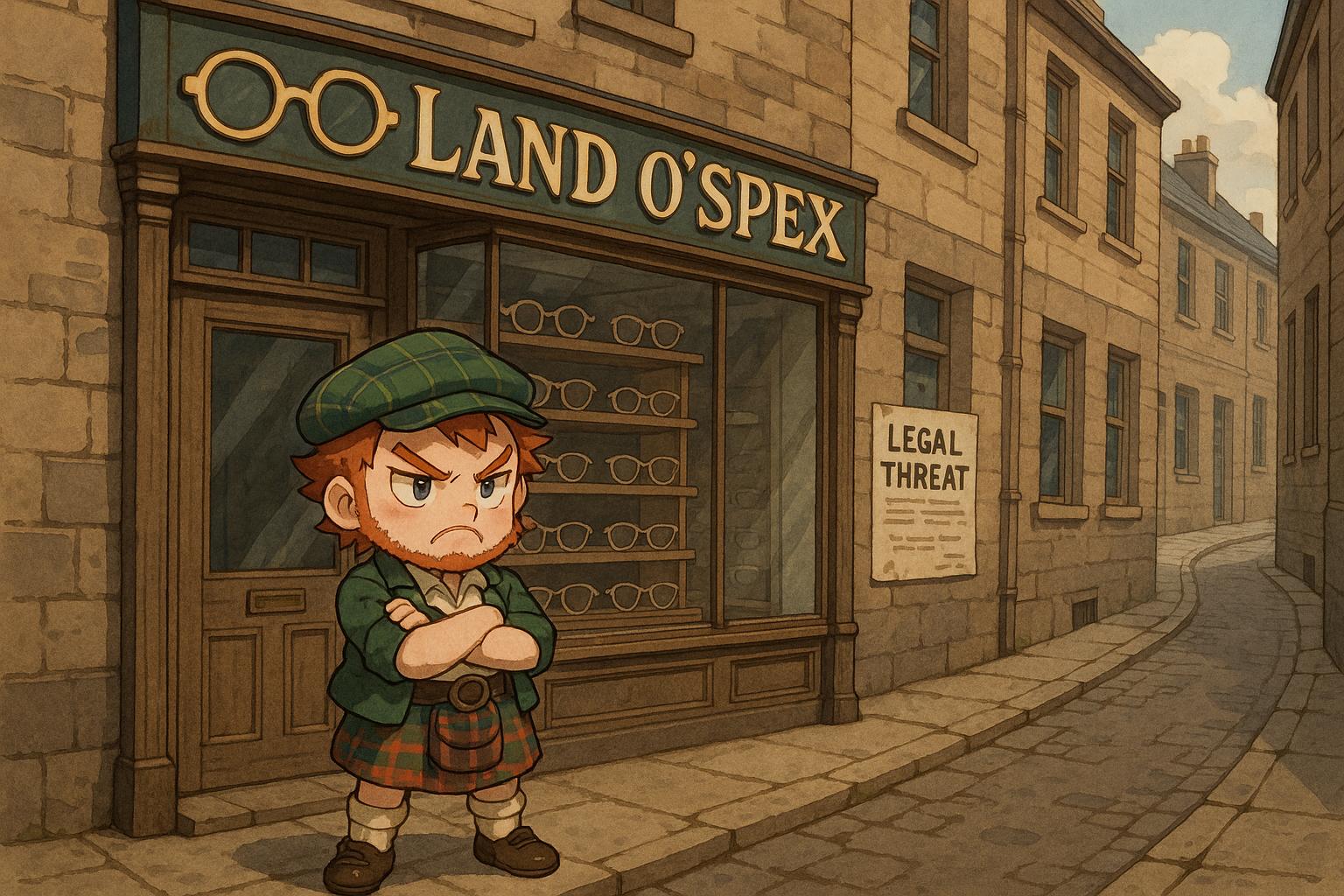This week, an established glasses shop in Dundee was forced to rename itself following a trademark dispute with the iconic punk band the Sex Pistols. After over a decade of trading under the name Spex Pistols, the boutique has now become Land O’Spex. The change followed a legal ‘cease and desist’ letter from the band, claiming that the shop's logo bore too close a resemblance to theirs. Owner Richard Cook expressed frustration and helplessness, stating, “I just don’t have the resources to challenge their action in any way… we’re a wee spectacle shop in the smallest street in Dundee.” This incident reflects a growing trend of small businesses caught in legal battles against larger brands, where the financial might and reputation of these corporations often lead to swift changes for local entrepreneurs.
This battle is far from unique; many local businesses in Tayside and Fife have faced similar challenges, with varying degrees of success. For instance, Lisa Chandler, a young entrepreneur from Dunfermline, experienced a significant setback when her venture, Elsie Cosmetics, attracted the attention of L’Oréal Paris. Despite her best efforts, including investment in branding and marketing, Chandler was forced to alter her business name after L’Oréal threatened legal action, claiming that her brand could be confused with its established product line. “I spent my savings having a logo designed… now I have to change everything,” lamented Chandler, who eventually settled for the modified name Elsie by Lisa, before eventually shuttering her business altogether.
Such disputes are emblematic of broader patterns seen in the cosmetics industry. In a notable parallel, L’Oréal's aggressive defence of its trademarks has come to light in various instances, showcasing a tendency to pursue legal action against smaller firms—which raises questions about the balance of power in brand protection. Similar cases have involved salon owners, such as Rebecca Dowdeswell, who found herself at odds with L’Oréal over her business name ‘nkd.’ The legal implications of these cases highlight how established brands wield considerable influence, often leaving smaller players with little choice but to capitulate.
In another incident, Perth barber Will Robertson attempted to leverage the popularity of the BBC show Peaky Blinders by rebranding his shop from Sweeney Todd to Peaky Blinders. However, the production company swiftly intervened, claiming he was trying to "free-ride" on the show's fame. As a result, Robertson not only had to abandon his name change but also faced financial losses from the promotional materials he had already ordered. This pattern of larger brands leveraging legal resources against smaller businesses is indicative of a corporate landscape that prioritises name protection, often at the expense of local identity.
A contrasting example of resilience can be seen in the case of D&G Autocare, a Fife garage chain that found itself facing Dolce & Gabbana in a trademark dispute. Initially threatened over name similarities, D&G Autocare ultimately triumphed when the Italian fashion brand failed to formally object to their application within the designated timeframe. This victory became a beacon of hope for smaller businesses, highlighting that perseverance can sometimes pay off against more prominent corporate entities.
Further illustrating the often humorous yet stark nature of these disputes is the case of Titanic Pizza Company, which faced a trademark threat from global fast-food giant KFC over its use of the name “Family Feast” for a menu item. After revealing the name had been in use since 1992—well before KFC trademarked it in 2009—the takeaway stood firm against KFC’s initial threats and ultimately retained its branding.
Even realms seemingly unrelated to food and fashion have not been spared. A Dundee pub owner, Mike Craig, received legal notice from Yoko Ono regarding the continued use of his establishment's name, Lennon’s Bar, which references her late husband. Despite maintaining that the bar had operated under that name for years, Craig agreed to comply with Ono's demand to avoid costly legal battles. This incident underscores how cultural and artistic legacies can similarly become entangled in trademark disputes.
Ultimately, the stories of these Tayside and Fife traders reveal an ongoing struggle that many small businesses face against the might of larger corporations. Their experiences resonate with broader themes in business culture, challenging us to consider the implications of trademark enforcement. For entrepreneurs like Richard Cook, the situation is a challenging reminder of the vulnerability that accompanies small-scale ventures in an increasingly competitive and litigious market.
Source: Noah Wire Services
